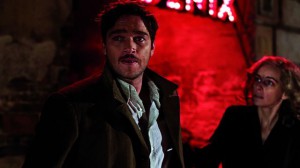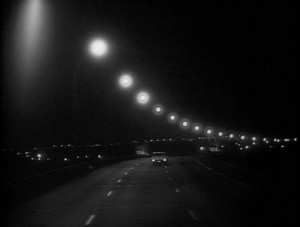My column for Caíman Cuadernos de Cine, submitted on March 21, 2019. — J.R.
It’s tiresome to keep hearing from several American colleagues what a lousy year 2018 supposedly was for movies — “movies” being virtually equated with Hollywood crap in much the same way that “the world” is often equated with the U.S. (with Cuarón, Farhadi, Pawlikowski, and a few others occasionally accorded the dubious status of honorary Americans, usually on the basis of their Oscars). Given how much non-American cinema one can see nowadays via streaming, this is an inexcusable way of allowing the big companies to keep their stranglehold on what passes for film culture, making it easier than ever to miss out on what matters.
Even so, I’m embarrassed to admit that I didn’t recognize the brilliance of Christian Petzold until recently, when I saw Transit (2018) — having previously seen only his Ghosts (2005) and Barbara (2012). Having now accessed, in swift succession, his Phoenix (2014), Yella (2007), Jerichow(2008), and Barbara again — I feel that it’s the dreamlike, hallucinatory surfaces (both aural and visual) of Yella, Phoenix, and Transit more than the literal places and spaces of Jerichow and Barbara that best capture Pertzold’s investigations into historical and existential identity. The historical displacements created in Transit of filming a story about occupied France in contemporary Marseille — recalling yet modifying the displacements of Godard’s 1965 Alphaville brought about by using contemporary Paris to evoke the future — match the psychological and existential displacements of the characters while ‘playing’ (i.e., either pretending to be or stylishly embodying) various versions of themselves, which also approximates much of the ambiguous plot-spinning of Yella and Phoenix. (Versions of the same sort of duplicitous role-playing or enactment appear to be operative in Jerichow and Barbara, but they also seem less obviously apparent, at least to me.) And given Petzold’s uncanny skills as both a storyteller and a director of actors, his grasp of role-playing extends to his mastery over guiding or confusing the various roles of spectators (i.e., us) in following and evaluating the characters.
What Petzold does with sound — the sudden tremors of broken glass or moving water in Yella; the never-quite-finished strains of Kurt Weill’s “Speak Low” in Phoenix (identified as an American song, albeit one composed by a German immigrant) that never seem wholly resolved harmonically, even when the song finally reaches its conclusion during the final credits — may be even more consequential than what he does with image. Our sense of place and placelessness in Transit is largely inflected by our fluctuating sense of period (conveyed through both sound and image), and the calculated absence of mobile phones and computers combined with contemporary settings yields an uncertainty about how much we’re residing in the present and how much in the historical past — and to what extent the existential condition of stateless suspension experienced by immigrants belongs to today or to yesterday or to both.




